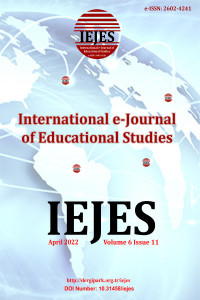Exploring Teacher Knowledge in Natural Sciences
Teacher knowledge, subject matter knowledge, pedagogical content knowledge, misconceptions, natural sciences
Exploring Teacher Knowledge in Natural Sciences
Teacher knowledge, subject matter knowledge, pedagogical content knowledge, misconceptions, natural sciences,
___
- Ben-Peretz, M. (2011). Teacher knowledge: What is it? how do we uncover it? what are its implications for schooling? Teaching and Teacher Education, 27, 3-9.
- Carrier, S. J., Tugurian, L., P. & Thomson, M., M. (2013). Elementary science indoors and out: Teachers, time, and testing. Research in Science Education, 43, 2059-2083.
- Cresswell, J.W. & Plano clark, V.L. (2011). Designing and conducting mixed methods research. (2nd Edition). Sage Publications, Los Angeles.
- Bartos, S. A., Lederman, N. G., & Lederman, J. S. (2014). Teachers` reflection on their subject matter knowledge structures and their influence on classroom practice. School Science & Mathematics, 114(3), 125-138.
- DeJonckheere, M., & Vaughn, L.M. (2019). Semi-structured interviewing in primary care research: a balance of relationship and rigour. Family Medicine and Community Health. https://doi.org/10.1136/fmch-2018-000057
- Department of Basic Education (DBE). (2011). Curriculum and assessment policy statement grade 7-9. Natural Sciences. Pretoria: Government Printers.
- Department of Basic Education (DBE). (2015). National senior certificate school subject report. Pretoria.
- Department of Education. (2011). National curriculum statement grades r-12 (schools), Natural sciences. Pretoria. National Department of Education.
- Diamond, B,S, Maerten, J, Rohrer, R, E & Lee, O. (2014). Effectiveness of a curricular and professional development intervention at improving elementary teachers` science content knowledge and student achievement outcomes: Year 1 results. Journal of Research in Science Teaching, 51(5), 635-658.
- Grossman, P. L. & Richert, A. E. (1988). Unacknowledged knowledge growth: A re-examination of the effects of teacher education. Teaching and Teacher Education, 4(1), 53-62.
- Halai, N., & Khan, M., A. (2011). Developing pedagogical content knowledge of science teachers through action research: A case study from Pakistan. Asia- Pacific Forum on Science Learning and Teaching, 12(1), 1-24.
- Leta, D.T., Ayele, M.A., & Kind, V. (2021). Dialogic teaching approach vis-à-vis middle school physics teacher’s content knowledge. EURASIA Journal of Mathematics, Science and Technology Education, 17(1), https://doi.org/10.29333/ejmste/9613
- Leung, L. (2015). Validity, reliability, and generalizability in qualitative research. Journal of Family Medicine and Primary Care. 4 (3), 24-27.
- McCombes, S. (2019). Research design: Types, methods, and examples. Scribbr.
- McMillan, J.H. & Schumacher, S. (2010). Research in education: Evidence-based inquiry (7th Ed). USA: Pearson Education.
- Merriam, S. B. (2009). Qualitative research: A guide to design and implementation. Revised and expanded from qualitative research and case study applications in education. San Franscisco: Jossey-Bass.
- Mudau, A.V. (2016). The classroom practice diagnostic framework: A framework to diagnose teaching difficulties of science. Eurasia Journal of Mathematics, Science and Technology Education, 12(11), 2797-2815.
- Nieuwenhuis, J. (2016). Qualitative research designs and data gathering technique. In Maree, K. First steps in research. Pretoria: Van Schaik publishers.
- Nkanyani, T.E. & Mudau, A.V. (2019). Natural sciences teachers` experiences on teaching planet earth and beyond knowledge strand. Journal of Turkish Science Education, 16 (4), 478-488.
- Patton, M. Q. (2002). Qualitative research and evaluation methods. US: Sage Publications.
- Rohaan, E. J., Taconis, R & Jochems, W.M.G. (2012). Analysing teacher knowledge for technology education in primary schools. International Journal of Technology and Design Education, 22, 71-280.
- Rollnick, M., & Mavhunga, E. (2016). Pedagogical content knowledge in the book: Taber, K.S., & Alkpan, B. (EDS). Science education-An international course companion. Rotterdam: Sense Publishers.
- Rosenshine, B. (2012). Principle of instruction: Research-based strategies that all teachers should know. American Educator, Spring.
- Sedibe, M. (2014). Natural science teachers’ perceptions of their teaching competence in senior phase schools in Soweto area. Gauteng Province. Journal of Anthropology, 18(3), 115-122.
- Shulman, L.S. (1986). Those who understand: knowledge growth in teaching. Educational Researcher, 15(2), 4-14.
- Singh, R. J. (2014). Is mother-tongue education possible in a language-diverse province? A case of limpopo province. Mediterranean Journal of Social Sciences, 5(25), 141-147.
- Usak, M., Ozden, I., & Ingo, E. (2011). A case study of beginning science teachers’ subject matter (SMK) and pedagogical content knowledge (PCK) of teaching chemical reaction in Turkey. European Journal of Teacher Education, 34(4), 407-429.
- Ventak, H & Spaull, N. (2015). What do we know about primary teachers’ mathematical content knowledge in South Africa? An analysis of SACMEQ 2007. International Journal of Educational Development, 41,121-130.
- Yilmaz-Tuzun, O. (2008). Pre-service teachers, beliefs about science. Journal of Science Teacher Education, 19, 183-204.
- Başlangıç: 2017
- Yayıncı: Tamer KUTLUCA
Hülya ASLAN EFE, Sadreddin TUSUN, Ali Osman ALAKUŞ, Rıfat EFE
Continuous Assessment in Malawian Primary Schools: An Effective Policy on Paper
The Negative Consequence of Teacher Directed Violence to Student Learning
Exploring Teacher Knowledge in Natural Sciences
Thuli Gladys NTULİ, Tebogo NKANYANİ, Lettah SİKHOSANA, Awelani V MUDAU
Information Processing Ability and its Implications for Teaching and Learning
Mariette FOURİE, Gawie SCHLEBUSCH
Management of Students in Islamic Boarding Schools
Hardianto HARDİANTO, Eddy SETYANTO, Ayu WULANDARİ
The Difficulties and Educational Stress of Nursing Students in Clinical Practice during the Covid
Esma AKGÜL, Canan BİRİMOĞLU OKUYAN, Filiz POLAT
Character Education Human Nature Based-Curriculum in Science Learning of Primary School
